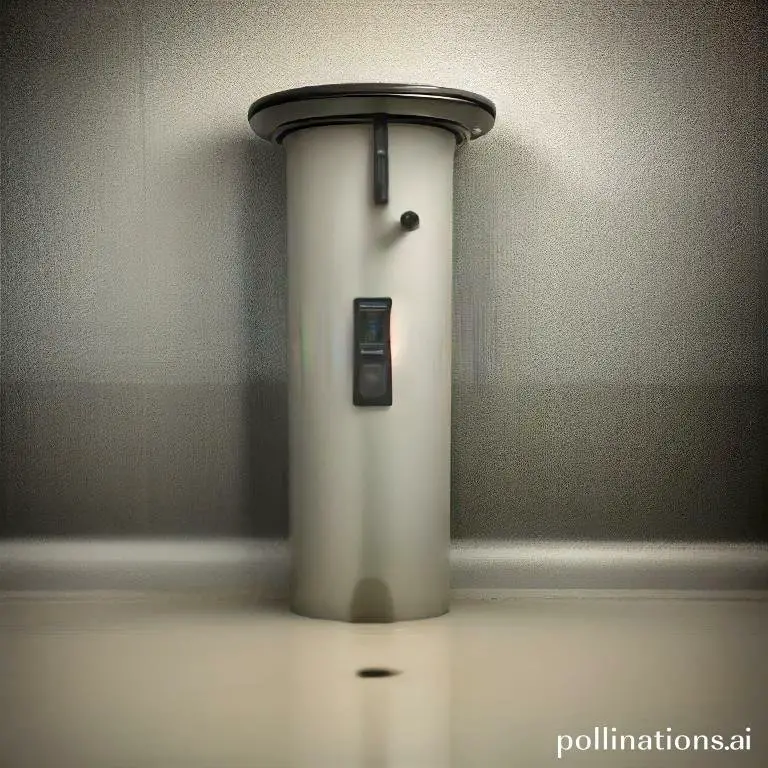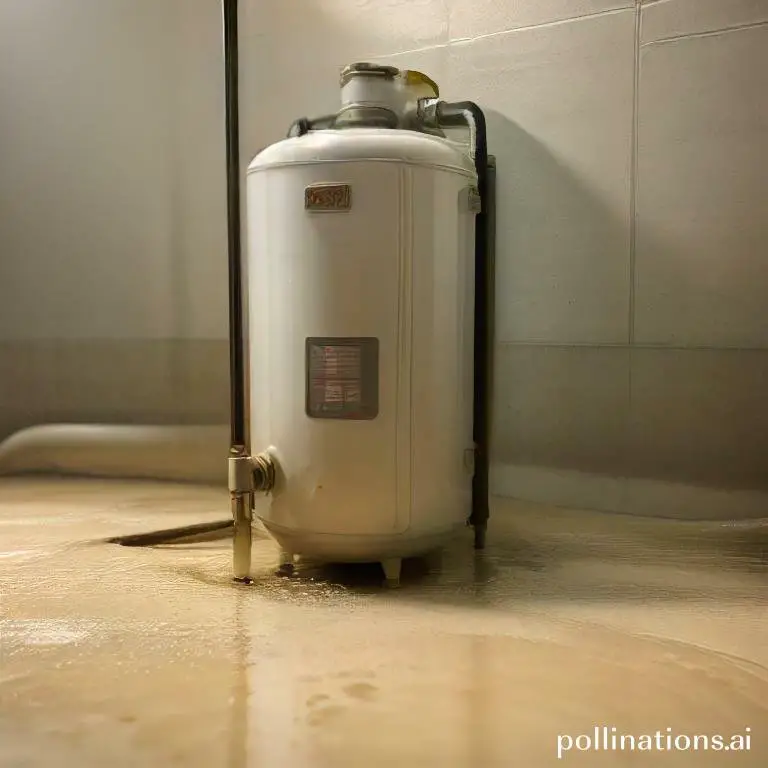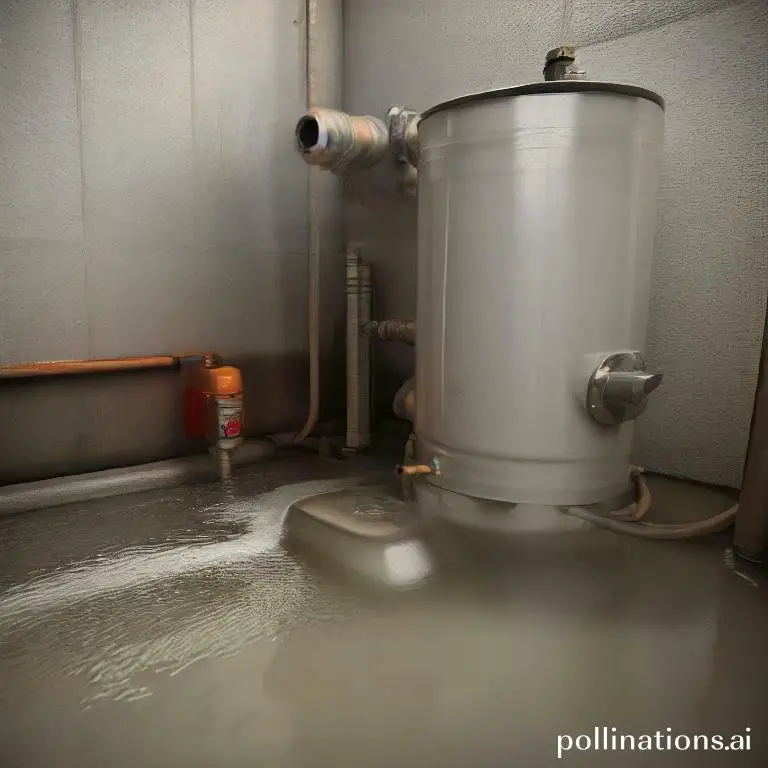
Water heater leaks can have a significant environmental impact. These leaks can lead to water wastage and contribute to water scarcity, a pressing issue in many parts of the world.
Additionally, water heater leaks can cause damage to the surrounding area, leading to potential mold growth and structural issues. Fundamental to address water heater leaks promptly to minimize their environmental impact and conserve this valuable resource.
Causes of Water Heater Leaks
1. Age of the Water Heater
One of the primary causes of water heater leaks is the age of the unit. Over time, the internal components of the water heater can deteriorate, leading to cracks or weakened seals. This can result in water leakage from the tank. Regular maintenance and periodic inspection of older water heaters are crucial to prevent leaks and ensure the longevity of the unit.
2. Corrosion and Rust
Corrosion and rust are common culprits behind water heater leaks. When the metal components of the water heater, such as the tank or pipes, come into contact with water, they are susceptible to corrosion. Over time, this corrosion weakens the structure, leading to leaks. Regular flushing and maintenance can help prevent the buildup of sediment and corrosion, prolonging the life of the water heater.
3. High Water Pressure
Excessive water pressure can cause stress on the water heater, leading to leaks. When the pressure inside the tank exceeds the recommended levels, it can put strain on the seals and connections, resulting in water leakage. Installing a pressure regulator or reducing valve can help regulate the water pressure and prevent leaks caused by high pressure.
4. Improper Installation or Maintenance
Improper installation or inadequate maintenance can also contribute to water heater leaks. If the water heater is not installed correctly or if essential maintenance tasks, such as inspecting and replacing worn-out parts, are neglected, it can lead to leaks. It is crucial to hire a professional for proper installation and to follow the manufacturer’s maintenance guidelines to avoid potential leaks.
| Cause | Prevention |
|---|---|
| Age of the water heater | Regular maintenance and inspections |
| Corrosion and rust | Regular flushing and maintenance |
| High water pressure | Install a pressure regulator or reducing valve |
| Improper installation or maintenance | Hire a professional for installation and follow maintenance guidelines |
Signs of Water Heater Leaks
Water heater leaks can cause significant damage if not detected and addressed promptly. By being aware of the signs of a potential water heater leak, you can take immediate action to prevent further damage and ensure the efficiency of your water heating system.
1. Visible Water Around the Heater
One of the most obvious signs of a water heater leak is the presence of water pooling around the unit. This can indicate a leak in the tank or any of the connecting pipes. If you notice water around your water heater, it is crucial to inspect the source of the leak and take appropriate measures to fix it.
2. Strange Noises Coming from the Heater
If you hear unusual noises, such as popping or hissing sounds, coming from your water heater, it could be a sign of a leak. These noises can indicate the presence of sediment buildup or water boiling inside the tank, which can lead to leaks over time. It is advisable to have a professional plumber assess the situation and perform any necessary repairs.
3. Reduced Hot Water Supply
A sudden decrease in hot water supply can also be an indicator of a water heater leak. If you find that your showers are not as warm as they used to be or that you are running out of hot water faster than usual, it is likely that there is a leak in your water heater. Addressing the issue promptly can help prevent further damage and ensure a consistent supply of hot water.
4. Increased Water Bills
Another sign of a water heater leak is a sudden increase in your water bills. If you notice a significant spike in your monthly water expenses without any apparent reason, it could be due to a leak in your water heater. Addressing the issue promptly can help you avoid unnecessary expenses and conserve water.
Pivotal to remember that water heater leaks should not be ignored. If you notice any of the above signs, it is recommended to seek professional assistance to diagnose and repair the issue. Regular maintenance and inspections can also help prevent leaks and extend the lifespan of your water heating system.
Prevention of Water Heater Leaks
Water heater leaks can cause significant damage to your home and lead to costly repairs. By taking preventive measures, you can avoid these issues and ensure the longevity of your water heater. Here are some effective strategies to prevent water heater leaks:
1. Regular Maintenance and Inspection
Regular maintenance is crucial for the proper functioning of your water heater. Schedule annual inspections by a professional plumber who can identify any potential issues and address them before they escalate. During these inspections, the plumber will check for signs of corrosion, loose fittings, and worn-out parts that could lead to leaks.
2. Installation of a Drip Pan
Installing a drip pan underneath your water heater can help contain any leaks and prevent water damage. The pan should be connected to a drain or have a drain pipe attached to it, ensuring that any water that accumulates is safely directed away from your home. Regularly check the drip pan and drain to make sure they are clear and functioning properly.
3. Replacement of Old Water Heaters
Old water heaters are more prone to leaks and other issues. If your water heater is more than 10 years old, it may be time to consider replacing it with a new, more efficient model. Newer water heaters are built with improved materials and technology, reducing the risk of leaks and increasing energy efficiency.
4. Reduction of Water Pressure
High water pressure can put unnecessary strain on your water heater, leading to leaks and other problems. Install a pressure regulator to maintain a consistent and safe water pressure level. This will help prevent leaks caused by excessive pressure and extend the lifespan of your water heater.

Repairing Water Heater Leaks
1. Shutting off the power and water supply
When dealing with water heater leaks, the first step is to ensure the safety of your home and yourself. It is crucial to shut off the power supply to the water heater. This will prevent any potential electrical hazards and ensure a safe working environment.
Additionally, pivotal to turn off the water supply to the water heater. This will prevent further leakage and minimize any potential water damage.
2. Identifying the source of the leak
Once the power and water supply have been shut off, the next step is to identify the source of the leak. This can be done by carefully inspecting the water heater and its surrounding areas.
Common areas where leaks occur include the pressure relief valve, drain valve, and the tank itself. It is essential to pinpoint the exact location of the leak to effectively address the issue.
3. Repair or replacement of damaged parts
After identifying the source of the leak, the next course of action is to repair or replace the damaged parts. This may involve tightening loose connections, replacing faulty valves, or patching up any cracks or holes in the tank.
If the damage is severe or extensive, it may be necessary to replace the entire water heater. Essential to consult a professional plumber to determine the best course of action based on the specific situation.
4. Testing the repaired water heater
Once the necessary repairs or replacements have been made, it is crucial to test the water heater to ensure its proper functioning. This involves turning on the power and water supply and monitoring the system for any signs of leakage.
It is recommended to observe the water heater for a period of time to ensure that the leak has been successfully resolved. Any further signs of leakage should be addressed promptly to prevent any potential damage or safety hazards.
| Step | Description |
|---|---|
| 1 | Shut off the power and water supply |
| 2 | Identify the source of the leak |
| 3 | Repair or replace damaged parts |
| 4 | Test the repaired water heater |

Environmental Impact of Water Heater Leaks
1. Contamination of Soil and Groundwater
Water heater leaks can have a detrimental effect on the environment, particularly on the soil and groundwater. When leaks occur, harmful chemicals, minerals, and sediments from the water heater can seep into the surrounding soil, contaminating it. This contamination can then spread to groundwater sources, polluting them and making them unsafe for consumption. It is crucial to address water heater leaks promptly to prevent further damage to the soil and groundwater.
2. Wasted Water Resources
Another significant impact of water heater leaks is the wastage of valuable water resources. Leaks result in a constant flow of water, leading to unnecessary water consumption. This not only puts a strain on the water supply but also increases water bills for homeowners. Conserving water is essential for sustainable living, and fixing water heater leaks is a crucial step towards that goal.
3. Increased Carbon Footprint
Water heater leaks also contribute to an increased carbon footprint. As water continuously leaks, it requires more energy to heat the water to the desired temperature. This increased energy consumption results in higher greenhouse gas emissions, contributing to climate change. By approaching and fixing water heater leaks, individuals can reduce their carbon footprint and help mitigate the effects of global warming.
To further emphasize the importance of addressing water heater leaks, let’s take a look at some factual data:
| Statistic | Value |
|---|---|
| Annual water wasted due to leaks in the US | 1 trillion gallons |
| Percentage of household leaks caused by water heaters | 25% |
| Carbon emissions from heating water | 10-15% of total household emissions |
Bottom Line
Water heater leaks can have a significant impact on the environment, leading to water waste, energy loss, and potential water damage. Fundamental to regularly maintain and inspect your water heater to prevent leaks and address any issues promptly. Consider upgrading to a more energy-efficient water heater to reduce your environmental impact and save on energy costs. In the event of a leak, take immediate action to minimize water damage and seek professional assistance for repairs. By taking proactive measures, you can help protect the environment and ensure the longevity of your water heater.
Remember, every drop counts in terms of preserving our planet’s resources. Don’t let a water heater leak go unnoticed or unaddressed. Take action today to protect the environment and your home.
Read More:
1. Leaks And Water Heater Manufacturer Reviews
2. Leaks In Water Heaters And Local Building Codes
















